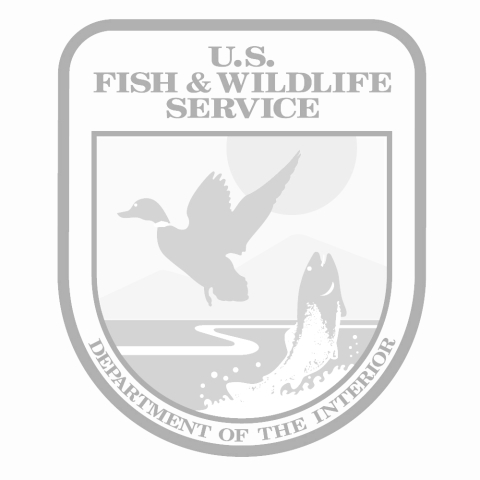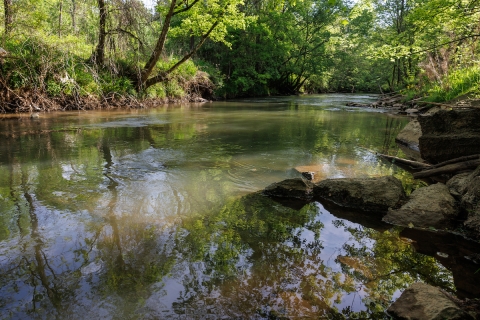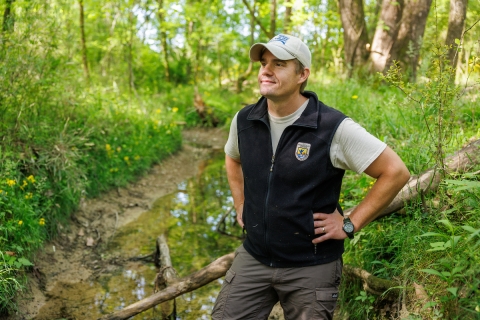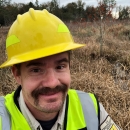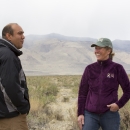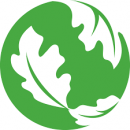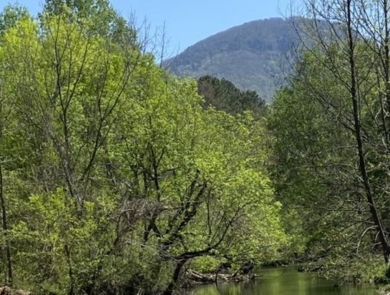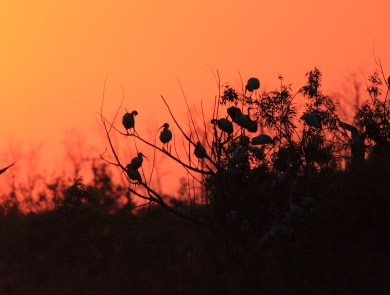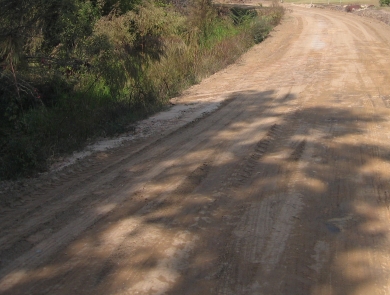The Partners for Fish and Wildlife Program strives to help private landowners with fish and wildlife habitat restoration on their land. Georgia is the biggest State east of the Mississippi River and more than 90 percent of the land in Georgia is privately owned. The future health of Georgia’s land, water, and wildlife depends upon private landowners.
Who are the Partners?
Anyone can be a partner -- farmers, ranchers, city dwellers, local agencies, private organizations, corporations, government agencies, educational institutions, and anyone interested in the conservation of wildlife habitat on private lands.
What can Partners for Fish & Wildlife do for you?
If you need help solving a land management problem, the U.S. Fish and Wildlife Service can provide assistance, or help facilitate with other agencies, on a variety of issues including:
- Wetland restoration and protection
- Nest structures or nesting islands
- Food and shelter for fish and wildlife
- Soil and water quality improvement
- Pesticide use reduction
- Native plant restoration
- Stream restoration
If your property contains damaged habitat that can be restored for wildlife; or, if you want to manage a portion of you property for wildlife, but don’t know where to begin, we may be able to work with you to develop and implement a plan that meets your needs. On the ground, we can provide certain structures, help move dirt, establish bottomland hardwood trees and other vegetation, and much more.
Technical assistance is also available to landowners through U.S. Department of Agriculture programs and various programs available through the State fish and wildlife agencies and certain conservation organizations. The U.S. Fish and Wildlife Service will assist you in recognizing opportunities within these programs. If your project meets certain criteria, the U.S. Fish and Wildlife Service may share or pay certain costs.
How do I become a Partner?
Individual landowners can become involved by contacting the U.S. Fish and Wildlife Service. In Georgia, you can reach out to one of our Partners Biologists to discuss your needs, the opportunities available, and assist you as possible.
Habitats of Special Concern
In Georgia, the Partners for Fish and Wildlife Program has focused on the restoration of longleaf pine habitat, restoration of degraded streams and riparian riparian
Definition of riparian habitat or riparian areas.
Learn more about riparian (streamside) areas, and restoration and improvement of endangered, threatened, and rare species habitat. Since 1995, approximately 145 private landowners have restored or enhanced about 11,000 acres of fish and wildlife habitat through the Partners Program in the State.
Longleaf Pine -- The longleaf pine ecosystem once covered an estimated 90 million acres in the southeastern U.S. Today, less than 3 million acres remain (over 97 percent decline), mostly in the coastal plains of the Carolinas, Georgia, Florida, Alabama, Louisiana, and Texas. Over 30 plant and animal species associated with longleaf pine ecosystems are threatened or endangered, including the red-cockaded woodpecker and the eastern indigo snake. Other rare plant and animal species that are associated with longleaf pine habitats include the sandhills rosemary, Pickering’s morningglory, Bachman’s sparrow, and gopher tortoise. In Georgia, the Partners Program is working with the Georgia Forestry Commission, the Longleaf Alliance, the National Fish and Wildlife Foundation, and other organizations to help landowners restore and enhance the longleaf pine habitat. An important component of this ecosystem is the ground-cover of wiregrass and other herbaceous plants. To fully restore this ecosystem, the Partners Program assists landowners in implementing prescribed fire programs. Restoration costs for longleaf pine habitats generally range from $175/ acre up to $350/acre. Enhancement of longleaf ecosystems usually costs anywhere from $12/acre (for prescribed burning) up to $120/acre (for midstory removal).
Streams and Riparian Areas -- Streams and riparian (streamside) areas in Georgia are important to many fish and wildlife species. Many streams are degraded due to human disturbance. The Partners Program is working with the Georgia Soil and Water Conservation Commission to assist landowners in restoring the integrity of streams and riparian areas by fencing out cattle and reestablishing buffer areas. This reduces erosion and stabilizes the streams. Costs of these projects generally range from $1.25 to $4.00 per linear foot. The Partners Program also assists landowners in stabilizing stream banks and riparian areas by installing tree revetments (cut trees placed along an eroding stream bank to reduce erosion and help stabilize the bank) and planting trees. These in-stream projects range from $25 per foot up to $45 per linear foot. These stream restoration projects may also benefit rare, endangered, and threatened fish species, such as the robust redhorse, Conasauga logperch, Amber Darter, and blue shiner; and several mussel species, such as the shiny-rayed pocketbook, southern acornshell, and purple bankclimber.
Project Highlights
Park Creek Elementary Partnership
The USFWS, Georgia Department of Natural Resources, Tenessee Aquarium and various partners together for the 2023 Earth Day Event at Park Creek Elementary to provide students hands-on learning opportunities about their natural surroundings. The Partners for Fish and Wildlife Program has been working with the school community to restore stream and riparian habitat for the benefit of the community and the federally threatened trispot darter.
Contact Information
